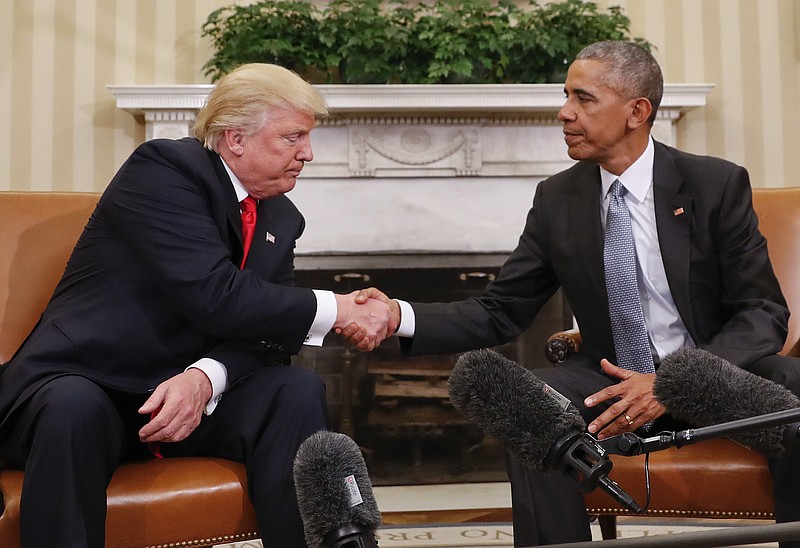EDITOR' NOTE: This column was co-written by Joy-Ann Reid. E.J. Dionne and Reid are co-editors of "We Are the Change We Seek: The Speeches of Barack Obama," which was published last week. This column is partly drawn from the book's introduction.
NEW YORK - Our nation is about to replace a president who loves soaring rhetoric and extended argument with a chief executive who prefers tweets.
And there is an irony in this transition. Barack Obama resolutely makes the case for moving forward by referring again and again to the lessons of American history. Donald Trump, by contrast, wants to bring us back to a glorious past - we need to become great again - but rarely cites history at all, preferring anecdotes about his own experiences or knocks on the last eight years.
The presidency itself, of course, often pushes those who hold the office to higher rhetorical ground. Trump seems reluctant to change much of anything about himself, but he might usefully consider what he could learn from Obama.
We ask that question knowing that speechmaking genius is not and has never been essential to a successful presidency. Over the last century, the list of presidents we lift up as especially gifted speakers is short - Franklin Roosevelt, John F. Kennedy, Ronald Reagan, Bill Clinton and Obama.
In editing a collection of Obama's speeches published last week, "We Are the Change We Seek," we were struck that while he drew on all these presidential forebears in his approach to persuasion, his first political love was Abraham Lincoln. This was a sensible choice for a politician from Illinois who had declared his presidential candidacy in Lincoln's adopted hometown of Springfield, and whose election as the first African-American president fulfilled the work of the Great Emancipator.
Obama had something else in common with Lincoln: a view that the best way to redeem the promise of justice is to insist that it was right there from the country's very beginning, inherent in its founding documents. Obama bound himself to our past to change our future.
Yet Obama's rhetorical approach was distinctly his own - enlivened by the oratorical style of the civil rights heroes and the theology of civil rights Christianity.
While always reminding Americans of how far we had to go, particularly on the question of racial equality, Obama persistently urged his own side to count up the victories won, successes earned, possibilities realized through activism and engagement.
Obama's conservative detractors regularly accused him of "apologizing" for America. In truth, he never stopped making the case for an America with an exceptional capacity for self-correction. Like his theological hero, Reinhold Niebuhr, Obama understood human frailty - "original sin" in Niebuhr's terms - and also the human capacity for transcendence. He was, like Niebuhr, resolutely a realist. Yet he kept placing those bets on hope. "Yes we can" was a clever political slogan, but it went to the heart of the case he would make again and again, right down to the final lines of his farewell address last week.
Let's face it: Trump is unlikely to channel Obama very often. They have sharply divergent views of the trajectory of American history. A large philosophical chasm separates them. They also got to the Oval Office starting from very different places.
The extended speech itself is clearly not Trump's thing. His most important effort in this sphere was his acceptance speech at the Republican National Convention. It underscored that where Obama heavily favored the word "we," Trump is rather fond of the word "I." Thus, the memorable line in Trump's address: "Nobody knows the system better than me, which is why I alone can fix it." There was also this, in all capital letters in the prepared text: "I AM YOUR VOICE."
However divided the country became under Obama, he always signaled that he saw himself as the president of all Americans. While Trump nodded to this idea on election night, it has not been his natural calling. The man who loves to talk about himself still needs to discover the power of the first word of our Constitution.
Washington Post Writers Group
